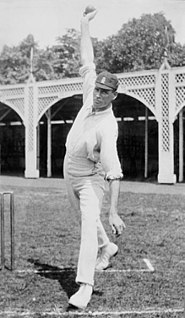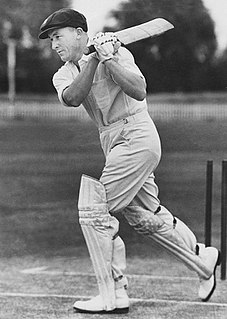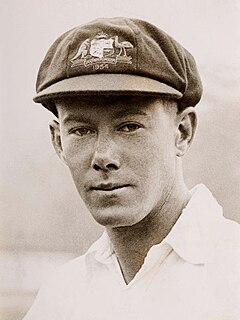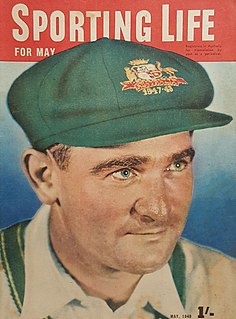Related Research Articles
John Barnes may refer to:
Richard Barnes may refer to:

Cricket Australia (CA), formerly known as the Australian Cricket Board (ACB), is the governing body for professional and amateur cricket in Australia. It was originally formed in 1905 as the 'Australian Board of Control for International Cricket'. It is incorporated as an Australian Public Company, limited by guarantee.

In cricket, a player's bowling average is the number of runs they have conceded per wicket taken. The lower the bowling average is, the better the bowler is performing. It is one of a number of statistics used to compare bowlers, commonly used alongside the economy rate and the strike rate to judge the overall performance of a bowler.

James Dixon Barnes is a Scottish-born Australian rock singer and songwriter. His career both as a solo performer and as the lead vocalist with the rock band Cold Chisel has made him one of the most popular and best-selling Australian music artists of all time. The combination of 14 Australian Top 40 albums for Cold Chisel and 13 charting solo albums, including nine No. 1s, gives Barnes the highest number of hit albums of any Australian artist.

Sydney Francis Barnes was an English professional cricketer who is regarded as one of the greatest ever bowlers. He was right-handed and bowled at a pace that varied from medium to fast-medium with the ability to make the ball both swing and break from off or leg. In Test cricket, Barnes played for England in 27 matches from 1901 to 1914, taking 189 wickets at 16.43, one of the lowest Test bowling averages ever achieved. In 1911–12, he helped England to win the Ashes when he took 34 wickets in the series against Australia. In 1913–14, his final Test series, he took a world series record 49 wickets against South Africa.

Sidney George Barnes was an Australian cricketer and cricket writer, who played 13 Test matches between 1938 and 1948. Able to open the innings or bat down the order, Barnes was regarded as one of Australia's finest batsmen in the period immediately following the Second World War. He helped create an enduring record when scoring 234 in the second Test against England at Sydney in December 1946; exactly the same score as his captain, Don Bradman, in the process setting a world-record 405 run fifth wicket partnership. Barnes averaged 63.05 over 19 innings in a career that, like those of most of his contemporaries, was interrupted by the Second World War.

The Australian cricket team in England in 1948 was captained by Don Bradman, who was making his fourth and final tour of England. The team is famous for being the only Test match side to play an entire tour of England without losing a match. This feat earned them the nickname of The Invincibles, and they are regarded as one of the greatest cricket teams of all time. According to the Australian federal government the team "is one of Australia's most cherished sporting legends".

William Barnes was an English first-class cricketer who played for Nottinghamshire County Cricket Club between 1875 and 1894 and the England cricket team between 1880 and 1890. In 1890 he was named as one of the Wisden Cricketers of the Year. He toured Australia three times and North America once. Barnes was on the groundstaff at Lord's between 1895 and 1898 and umpired as required. He was landlord of the Angel Inn, Mansfield Woodhouse in the off-season. It is there that he died in March 1899 and he is buried in the local cemetery.

Ronald Arthur Hamence was a cricketer who played for South Australia (SA) and Australia. A short and compact right-handed batsman, Hamence excelled in getting forward to drive and had an array of attractive back foot strokes. Already the youngest Australian to play district cricket, he was also, from the death of Bill Brown in 2008 until his own death in 2010, the oldest surviving Australian Test cricketer.
The 1938 Ashes series between Australia and England was drawn. England and Australia won a Test each, with two of the other Tests drawn and the third game of the series, scheduled for Manchester, abandoned without a ball being bowled, only the second instance of this in more than 60 years of Test cricket. The Australians retained The Ashes.
1909 was the 20th season of County Championship cricket in England and featured a Test series between England and Australia. Kent won the championship and Australia, captained by Monty Noble, won the Test series.
1912 was the 23rd season of County Championship cricket in England. The much-criticised Triangular Tournament of Test Matches was held between England, Australia and South Africa. The contest was affected by one of the wettest summers on record and was never repeated. England retained the Ashes, having defeated Australia in one Test.
Keith Ormond Edley Johnson, MBE, was an Australian cricket administrator. He was the manager of the Australian Services cricket team in England, India and Australia immediately after World War II, and of the Australian team that toured England in 1948. The 1948 Australian cricket team earned the sobriquet The Invincibles by being the first side to complete a tour of England without losing a single match.
The England cricket team in Australia in 1886–87, generally known as Alfred Shaw's XI, was described by Wisden as "one of the strongest that ever left England for the Colonies". The team played 10 first-class matches, winning 6 with 2 draws and 2 defeats.
The English cricket team in Australia in 1901–02 lost the Test series to Australia, who came from one down to win 4–1 and thus retained The Ashes. The England side was a private venture of Archie MacLaren at the invitation of the Melbourne Cricket Club, after MCC had declined to send a team. Prior to this, all Test tours of Australia had been privately organised, but MCC took over the responsibility with the following tour in 1903–4. George Hirst, Wilfred Rhodes, KS Ranjitsinjhi, Stanley Jackson and CB Fry were all unavailable.
The English cricket team in Australia in 1907–08 lost the Test series, and with it the Ashes, 4–1. They were handicapped by Arthur Jones, their captain, having to miss the first three Tests through illness. Frederick Fane led the side during Jones' absence.

Bill Brown was a member of Donald Bradman's famous Australian cricket team, which toured England in 1948. Bradman's men went through their 34 matches without defeat; this unprecedented feat by a Test side touring England earned them the sobriquet The Invincibles.

Sid Barnes was a key member of Donald Bradman's famous Australian cricket team, which toured England in 1948. The team went undefeated in their 34 matches; this unprecedented feat by a Test side touring England earned them the sobriquet The Invincibles. A right-handed opening batsman, Barnes was part of Bradman's first-choice team and played in four of the five Tests—he missed one match due to injury—partnering the left-handed Arthur Morris.
References
- ↑ "Richard Barnes". ESPN Cricinfo. Retrieved 7 January 2016.
- ↑ "Richard Barnes". CricketArchive. Retrieved 30 January 2017.
| This biographical article related to an Australian cricket person born in the 1840s is a stub. You can help Wikipedia by expanding it. |